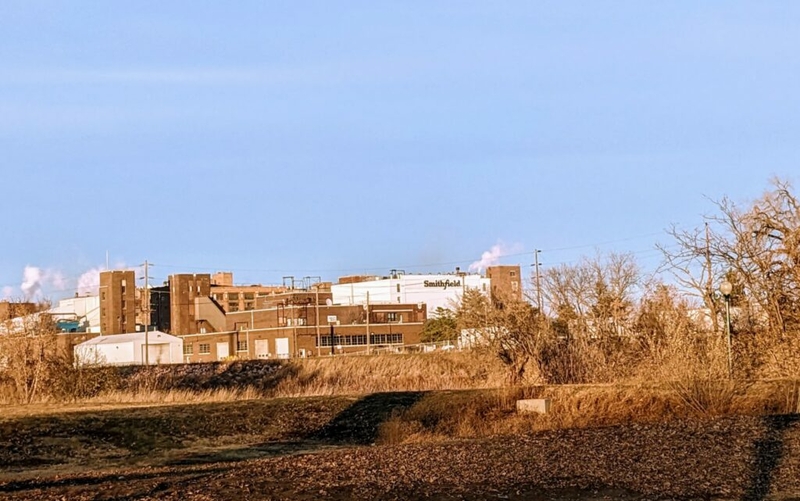Widow of former Smithfield employee challenges COVID-19 liability law

The widow of a slaughterhouse worker who died after contracting COVID-19 is challenging the constitutionality of a South Dakota law that preemptively absolves employers of liability for exposing workers to the virus.
The South Dakota Department of Labor (DOL) used the law this summer to justify denying the worker’s compensation claim to Karen Franken, whose husband died from COVID-19 at a point in 2020 when his employer, Sioux Falls-based Smithfield Foods, was one of the nation’s most significant viral hot spots.
The law in question was drafted by a lawyer who collaborates with the South Dakota Retailers Association (SDRA) and passed in 2020. It bars COVID-19 damages in court unless an employer, school, or property owner exposes people to the virus on purpose.
Discussions about House Bill 1046, which became law with Gov. Kristi Noem’s signature, were framed around frivolous lawsuits. It had the support of a wide range of stakeholders, including retailers, school districts, local governments and other business owners.
“We’ve heard rumblings of individuals using COVID-19 to sue businesses, sue churches (or) sue schools, as a result of a pandemic that nobody knew how to control,” SDRA Executive Director Nathan Sanderson told the House State Affairs Committee.
Workers comp applicability questioned
Franken’s case doesn’t involve a wrongful death lawsuit. That was the crux of the argument when her lawyer Mark Welter appeared to make his client’s case on Monday before Judge Jon Sogn.
Franken is seeking a worker’s compensation benefit, an area of South Dakota law administered by the state labor department.
At least 28 other states have passed some form of liability protection for COVID-19 since 2020. Thirteen of those laws don’t specifically mention worker’s compensation. Fifteen do. South Dakota is not among those 15.
That’s one reason, Welter said, that the DOL was wrong to dismiss a hearing for the insurance claim. A law governing civil lawsuits ought not upend the legal standards by which the DOL renders decisions about benefits for injured workers or their families.
“Every employer and every employee is presumed to have accepted the provisions of (worker’s compensation law),” Welter said.
Franken’s attorney said that the liability law doesn’t explicitly note retroactivity — noteworthy because the illness and death occurred well before its passage.
Smithfield’s attorney, Laura Hensley, said that retroactivity and a barring of worker’s compensation claims were both part of lawmakers’ intent. In briefs filed before the hearing, Hensley pointed out that the existence of a carve-out provision allowing for worker’s compensation claims in 15 states makes it clear that South Dakota’s legislature didn’t want to let employees file insurance claims for getting sick on the job.
“If the legislature did not intend to have worker’s compensation covered (by the law), they could have said so,” Hensley said.
But Franken’s court filings also argue that the law as written amounts to a violation of the South Dakota Constitution’s due process and equal protection rights. “Work-related injury” ought to be liberally interpreted, they argue, as other illness-related claims have been accepted as causes for compensation across the country and in South Dakota.
Hensley rebuffed that concern on Monday. Laws are presumed to be Constitutional, she said, and two other people have had their claims rejected for similar reasons.
Franken and her attorneys could have argued that Smithfield intentionally exposed its workers to COVID-19, as the law requires for a civil action to succeed in South Dakota. They did not.
“No remedy has been removed,” she said. “They could plead that there was an intentional act … they may not like it, but there is a remedy.”
Smithfield connection to illness unproven
There has been no determination that Craig Franken’s work at Smithfield was the cause of his illness and death, but there’s no question that a mass of slaughterhouse employees were sickened in the early days of the pandemic.
Smithfield never faced an extended closure, though it did close for a few weeks in April and May of 2020. Its close-quarters working conditions and alleged lack of worker protections were a source of heavy scrutiny, both in the public square and through official agency action. Workers were pushed to come to work through $500 “responsibility” bonuses for attendance, and some workers complained the company’s masks were similar to hairnets. Some opted to bring their own masks; others opted to stay home.
The company was fined $13,494 by the Centers for Disease Control (CDC) in September of 2020.
Craig Franken was a 40-year employee of Smithfield. He died at age 61 on April 19, 2020. Karen Franken asked the DOL for a worker’s compensation hearing in March of 2022, but the agency swiftly dismissed it, citing the 2021 law as its reasoning.
Her appeal to circuit court, her lawyers said Monday, is simply a legal action meant to force the DOL to let her prove that her husband’s illness was job-related.
Welter told Judge Sogn that she deserves that much.
“We never had the opportunity to present evidence as to the time and place of the injury,” Welter said. “These would be questions of fact.”
Sogn told the lawyers that he hoped to rule on the matter before the weekend. The judge made a point at the beginning of the hearing to say that none of the legal arguments or decisions would lessen the impact of Karen Franken’s loss. She was not present in court.
“Please pass on our condolences on the loss of her husband,” he told Welter and his associates.








